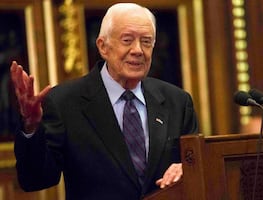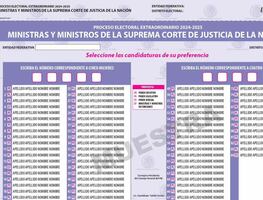Más Información

Anuncian cierre de oficinas de EU en México por funeral del expresidente Jimmy Carter; citas serán reprogramadas

Las noticias nacionales más consultadas de EL UNIVERSAL en 2024; Sheinbaum, “El Mayo” Zambada y Mpox

Alito Moreno urge a cambiar estrategia contra delincuencia; pide poner fin a tragedia de homicidios en gobiernos de Morena

SRE lamenta muerte de ministro Abel Escartín Molina; se desempeñaba en Embajada de México en Reino Unido
Republican presidential candidate Donald Trump would increase fees on some Mexican visas and all border crossing cards as part of a broader plan to force Mexico to pay for a wall along the southern U.S. border.
In a policy paper issued on Sunday, the frontrunner in a crowded Republican field said he would increase fees on temporary visas for Mexican chief executives, diplomats and North American Free Trade Agreement (NAFTA) workers if Mexico does not agree to pay for the wall.
Trump said he would also impound all remittance payments derived from illegal wages and increase fees at ports of entry from Mexico. Foreign aid cuts and tariffs would also be considered.
"The Mexican government has taken the United States to the cleaners," he said. "They are responsible for this problem, and they must help pay to clean it up."
Trump began his campaign in June by saying Mexico is sending its criminals and rapists to the U.S. The comment sparked outrage from Hispanic civil rights groups and others.
In his new position paper, Trump said he would triple the number of Immigration and Customs Enforcement (ICE) officers and pay for the increase by eliminating tax credit payments to illegal immigrants.
He would also increase penalties for people who overstay their visas and end the policy of giving automatic citizenship to the children of illegal immigrants.
Applicants seeking to enter the U.S. would have to certify that they could pay for their own housing, healthcare and other needs, he said, and he would raise the bar for the admission of refugees and asylum-seekers.
Trump said he would also place the issuing of green cards to foreign workers on pause so employers would have to hire from the domestic pool of unemployed workers.
"This will help reverse women's plummeting workplace participation rate, grow wages, and allow record immigration levels to subside to more moderate historical averages," he said.
On NBC's "Meet the Press," he said he would deport all undocumented immigrants and rescind U.S. President Barack Obama's executive orders on immigration.
The orders, if enacted, could protect as many as 5 million undocumented immigrants from deportation.
The Presidential election will be held in 2016.






